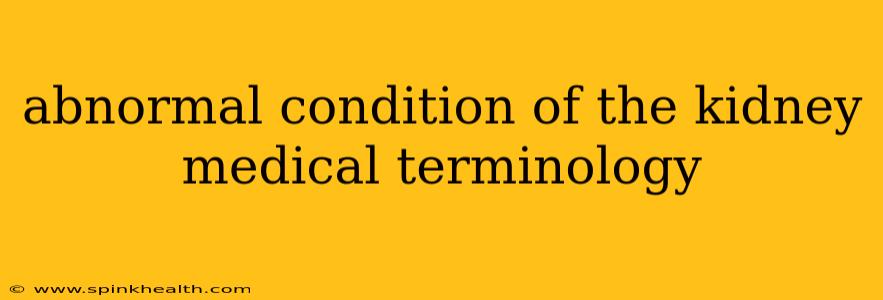Unraveling the Mysteries of Abnormal Kidney Conditions: A Deep Dive into Medical Terminology
The kidneys, those unsung heroes of our bodies, work tirelessly to filter waste, regulate blood pressure, and produce vital hormones. When these vital organs malfunction, the consequences can be severe. Understanding the medical terminology surrounding abnormal kidney conditions is crucial, both for healthcare professionals and for individuals seeking information about their own health or that of loved ones. This journey into the world of nephrology will explore various conditions, illuminating their complexities and the language used to describe them.
Let's start with the basics. The term "nephropathy" broadly refers to any disease of the kidney. But the story doesn't end there. Many specific conditions fall under this umbrella, each with its own unique characteristics and medical terminology.
What are some common abnormal conditions of the kidney?
This question opens the door to a wide range of possibilities. Some common abnormal conditions include:
-
Glomerulonephritis: This inflammatory condition affects the glomeruli, the tiny filtering units within the kidneys. Different types exist, each with its own cause and symptoms. You might hear terms like "post-infectious glomerulonephritis" (following a bacterial infection) or "IgA nephropathy" (involving immunoglobulin A).
-
Nephrotic Syndrome: This isn't a single disease but rather a collection of symptoms, including proteinuria (protein in the urine), edema (swelling), hypoalbuminemia (low albumin in the blood), and hyperlipidemia (high cholesterol). Underlying causes can be various, including glomerulonephritis or other kidney disorders.
-
Chronic Kidney Disease (CKD): This progressive loss of kidney function can stem from various causes, such as diabetes, high blood pressure, or glomerulonephritis. The stages of CKD are graded according to the glomerular filtration rate (GFR), a measure of how well the kidneys are filtering waste.
-
Acute Kidney Injury (AKI): Unlike CKD, AKI is a sudden decrease in kidney function. It can be caused by various factors, including dehydration, infections, certain medications, or severe illnesses. AKI can often be reversed with prompt treatment, while CKD is typically a long-term condition.
-
Polycystic Kidney Disease (PKD): This genetic disorder causes numerous cysts to develop in the kidneys, impairing their function over time. There are two main types: autosomal dominant PKD (ADPKD) and autosomal recessive PKD (ARPKD), differing in their inheritance patterns and severity.
What are the symptoms of kidney disease?
Symptoms can vary widely depending on the specific condition and its severity. Some common signs include:
-
Changes in urination: This could include increased frequency, decreased volume, foamy urine (due to protein), or blood in the urine (hematuria).
-
Swelling: Edema, often in the legs and ankles, is a common sign of kidney problems.
-
Fatigue: Kidney disease can lead to anemia and other imbalances that cause significant tiredness.
-
High blood pressure: Kidneys play a crucial role in blood pressure regulation, so dysfunction can lead to hypertension.
How is kidney disease diagnosed?
Diagnosing kidney disease often involves a combination of tests:
-
Blood tests: These assess creatinine and blood urea nitrogen (BUN) levels, indicators of kidney function.
-
Urine tests: These check for protein, blood, and other abnormalities.
-
Imaging tests: Ultrasound, CT scans, or MRIs can visualize the kidneys and detect structural abnormalities.
-
Kidney biopsy: In some cases, a small tissue sample is taken from the kidney for microscopic examination.
What are the treatments for kidney disease?
Treatment depends heavily on the specific condition, its severity, and the overall health of the individual. Options can range from lifestyle modifications (diet, exercise, blood pressure control) to medications to dialysis or kidney transplantation in advanced cases.
This exploration into the medical terminology surrounding abnormal kidney conditions offers just a glimpse into this complex area. Further research and consultation with healthcare professionals are crucial for accurate diagnosis and appropriate management of any kidney-related concerns. Remember, early detection and intervention are key to improving outcomes and managing kidney disease effectively.

